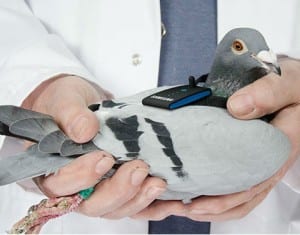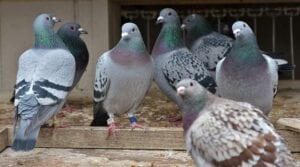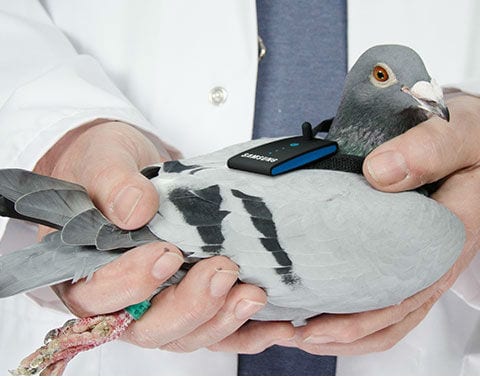
by Pigeon Patrol | Oct 26, 2023 | 4-S Gel Bird repellent, Animal Deterrent Products, Bird Deterrent Products, Bird Law, Bird Netting, Bird Spikes
The politicians are seated in a semi-circle at a meeting of the council. One by one, they raise their voices as part of the deliberation. “I believe it is time we took a position on this,” says a black-blazered woman. “It’s not an industry that I want to support,” a second woman, wearing dark-rimmed glasses, reads into the official record.
“It’s time,” concludes the mayor, donning the heavy chain that is the insignia of his office, “to end the practice in our community.”
It is a fall meeting of the District of North Vancouver’s city council and they are discussing whether people should be allowed to keep pigeons. Councillors Lisa Muri, in the blazer, and Megan Curren, with the glasses, ultimately vote with the mayor in favour of an outright pigeon ban.
Coun. Matthew Bond, one of those who votes against, says skeptically, “I don’t necessarily see this as a good use of our time.” But the bylaw passes, four to two.
Something smells, though. Only one property in the community is known to harbour pet pigeons. Only one complaint about pigeons, dating back several years, is known to be active. Only one city councillor has recused herself from the discussion. “I have been in a situation like this,” Coun. Betty Forbes says, at the same meeting. “So I’m stepping aside.”
One plus one plus one equals . . . a conflict of interest?
Documents obtained by the CBC under access-to-information seem to bolster that view of events. The “situation” was that Forbes lived next-door to pigeons. That she did not like pigeons. And that after complaining to the city as a private citizen to no avail, she took matters into her own hands; after being elected to council in 2018, in an email to two fellow councillors, she requested a bylaw banning residents from keeping the birds.
Emails viewed by Maclean’s suggest that during the spring, Muri initiated a process to change the district’s pigeon ownership rules, and kept Forbes up to date on its progress. But the whole project has since run into trouble because it turns out Kulwant Dulay, Forbes’ neighbour, cares deeply about his pigeons. He cares enough to go to court.
His petition to B.C. Supreme Court, dated Dec. 4, seeks to have the bylaw declared illegal and set aside. It relies heavily on the CBC’s reporting, referencing emails between Forbes and Muri earlier this year that appear to reveal a plot to hatch the bylaw.
Dulay is arguing that Forbes’s involvement was “biased and bad faith and acting in a conflict of interest,” says Camille Chisholm, a lawyer representing the pigeon enthusiast. The district has retained its own lawyers and was expected to respond in January.
The same week as Dulay’s petition was filed, the District of North Vancouver announced it was tasking former B.C. privacy commissioner David Loukidelis with investigating how the pigeon ban came to be. His review, the district announced, will assess the “awareness” of conflict-of-interest rules by councillors. The process is expected to take a couple of months.
Dulay, Chisholm adds, has kept homing pigeons as pets for years—including during his time in India before he immigrated to Canada. “My neighbours in the front and back, everybody loves my pigeons,” says Dulay, adding that other than Forbes’s, he hasn’t had a complaint in 17 years. “Everybody comes to my house and looks at them. It looks cool, them flying around.” Some have names. One is called “Big Boss.” His favourite pigeon is blue and white. He said it always comes to his hand.
Dulay keeps his 15 birds in a coop that’s about as tall as the backyard fence and roomy enough for him to enter and move around. During the warmer months, he lets them out to fly around the neighbourhood, including over other people’s yards. He said they always return.
Lately, he has wondered whether Forbes has a problem with him, not his pigeons. He said she “never talks” to him, and notes that he has never complained about her two barking dogs, though he believes he might have reason to.
His across-the-street neighbour, meanwhile, has spoken in his support. “I’ve had opportunity to go over and see the coop,” Krista Page told council on Nov. 18. ”It is clean. There’s no foul smell. I’ve never met neighbours that keep a tidier driveway and home and everything.” Page noted there have been no complaints from the Dulays’ other next-door neighbour, adding: “I just feel that this is very much a misuse of power.”
Forbes declined an interview request from Maclean’s but insisted in an email that there is “another set of correct facts” to the story. “However, because the mayor has requested an inquiry of all council and himself,” the email added, “I am unable to make any comments at this time.”
Her only public response came at the end of the same meeting Krista Page attended. “If I have erred in any way,” she said, “I assure council and the community that it was done inadvertently and in good faith with my understanding, as a new councillor, of the conflict-of-interest rules.”
Muri echoed Forbes in an email to Maclean’s, saying: “We are currently reviewing the process of this bylaw, so it would be inappropriate for me to comment.” But a response to the petition later filed in court by her lawyers denies the councillor was aware of any interest Forbes could’ve had in a pigeon ban beyond one “in common with electors of the municipality generally.”
The submission argues that neither councillor stood to gain financially from the bylaw and doubles down on the councillors’ position that the ban is legitimate and serves to protect residents from current and future pigeon keepers who might “adversely impact them or their property.”
To some, this is more than a dispute between neighbours. Givo Hassko, who is on the board of the Vancouver Poultry & Fancy Pigeon Association, told council in November he believed this was a test case for corruption in Canadian politics writ large. “If there are no consequences to how council goes to change bylaws here locally or Canada-wide,” he said, “then anyone—anyone—would get a green light.”
Hassko set up a GoFundMe to help with Dulay’s legal fees. At the time of writing, it had raised $700. A single commenter named Wayne, who pitched in $55, offered this input: “It is important that pigeons are not homeless.”
Source
Pigeon Patrol
Pigeon Patrol Products & Services is the leading manufacturer and distributor of bird deterrent (control) products in Canada. Pigeon Patrol products have solved pest bird problems in industrial, commercial, and residential settings since 2000, by using safe and humane bird deterrents with only bird and animal -friendly solutions. At Pigeon Patrol, we manufacture and offer a variety of bird deterrents, ranging from Ultra-flex Bird Spikes with UV protection, Bird Netting, 4-S Bird Gel and the best Ultrasonic and audible sound devices on the market today.
Canada’s top wholesaler for bird deterrent products for twelve consecutive years.
Contact us at 1- 877– 4– NO-BIRD, (604) 585-9279 or visit our website at https://www.pigeonpatrol.ca/
Bird Gone, Pigeon Gone, Pigeon problems, pigeon spikes, 1-877-4NO-BIRD, 4-S Gel, Bird Control, Pigeon Control, bird repellent, Bird Spikes, sonic bird repellent, stainless steel bird spikes, bird spikes Vancouver, Ultra Sonic Bird Control, Bird Netting, Plastic Bird Spikes, Canada bird spike deterrents, Pigeon Pests, B Gone Pigeon, Pigeon Patrol, pest controller, pest control operator, pest control technician, Pigeon Control Products, humane pigeon spikes, pigeon deterrents, pigeon traps, Pigeon repellents, Sound & Laser Deterrents, wildlife control, raccoon, skunk, squirrel deterrent, De-Fence Spikes, Dragons Den, Pigeon, Pigeon Patrol, Pigeons Roosting, Vancouver Pigeon Control, Bird Spikes, Bird Control, Bird Deterrent, Pigeon Deterrent, Surrey Pigeon Control, Pest, Seagull deterrent Vancouver Pigeon Blog, Birds Inside Home De-fence, Pigeon Nesting, Bird Droppings, Pigeon Dropping, woodpecker control, Keep The Birds Away, Birds/rats, seagull, pigeon, woodpecker, dove, sparrow, pidgeon control, pidgeon problem, pidgeon control, flying rats, pigeon Problems, bird netting, bird gel, bird spray, bird nails, bird guard, Pigeon control, Bird deterrents, Pigeon deterrents, Bird control, solutions, Pigeon prevention, Pigeon repellent, Bird proofing, Pest bird management, Pigeon spikes, Bird netting, Humane bird control, Bird exclusion, Urban bird control, Anti-roosting devices, Pigeon removal, Bird barriers
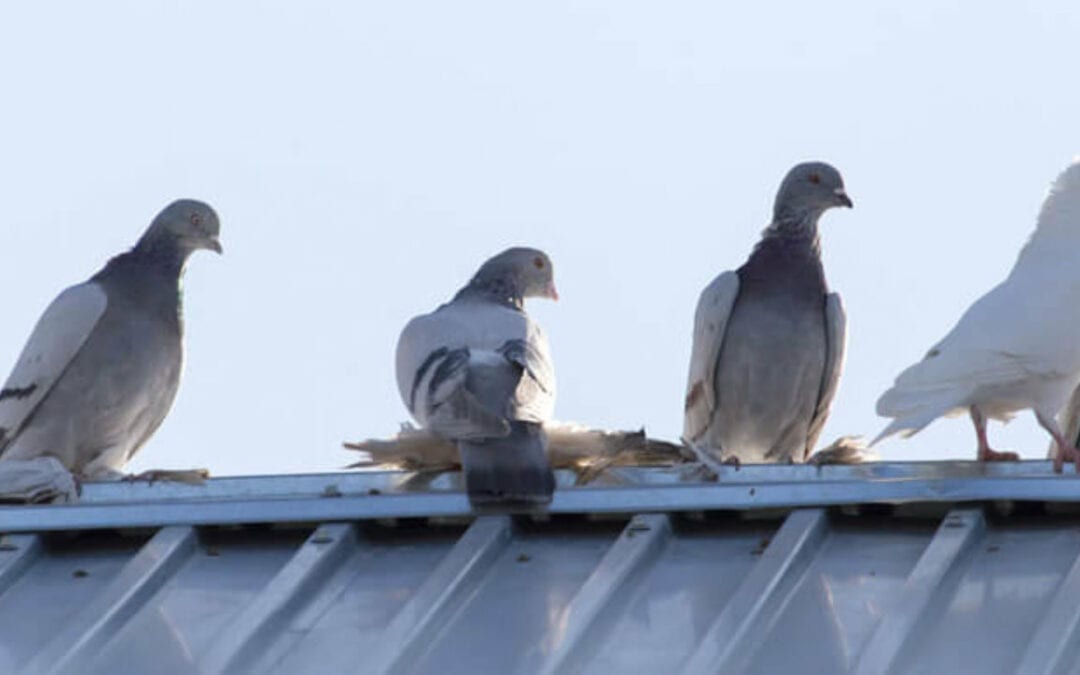
by Pigeon Patrol | Oct 17, 2023 | Bird Spike, Pigeon Droppings, Pigeon Patrol's Services, Pigeon Predators, Pigeon Spikes, Pigeons, Pigeons in the News
For those not familiar with the world of pigeon racing, the idea that a bird can be sold at an auction for thousands of dollars might sound almost ludicrous.
But even people within the industry were taken by surprise this week when New Kim, a two-year-old racing pigeon raised in Antwerp, Belgium, was auctioned for a record $1.8 million.
“We did not expect the pigeon (price) would go so high,” said Nikolaas Gyselbrecht, the CEO of Pigeon Auction House (PIPA), where New Kim was auctioned.
The price offered for New Kim beats the one paid for the former most expensive pigeon in the world, Armando, sold to a Chinese buyer for $1.48m in 2019.
“We can already say that these record prices are unbelievable because this is a female,” said Gyselbrecht. “Armando was a male. Usually a male is worth more than a female because it can produce more offspring, more children. So it’s very exceptional to have a female for this price.”\
New Kim was bred by Flemish trainer Gaston van de Wouwer, who raised many prize-winning racing pigeons and now, at 76, is retiring and selling all his 400 birds.
The online bidding on New Kim started on November 2 at a bit more than $200 but quickly went up to the thousands as the bidder “Hitman” held off competitors to lead the pigeon. On Tuesday, he stood unchallenged with an offer of $1.5m.
On Sunday, 30 minutes before the end of the auction, a frantic bidding war between Hitman and a bidder named “Super Duper” raised the price for New Kim to $1.8m
Belgium is considered the traditional heartland of pigeon racing, which became very popular in the country in the 19th century.
“There is no country in the world where so many pigeon fanciers live (in) such a high density with each other, like in Belgium,” says Gyselbrecht. “So you have 20,000 pigeon fanciers in a very small country competing (with) each other on a very high level. It’s like the Champions League.”
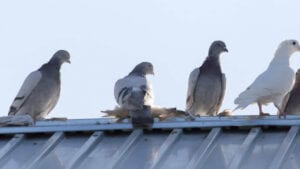
Why are racing pigeons so expensive?
Pigeon racing’s popularity has steadily dropped since the 1800s, when it found a fertile ground in Belgium.
After World War I, the sport was a common hobby for the working class, but amid higher costs of living and criticisms by animal welfare activists, pigeon racing became less of a common pastime affordable to many and more of a highly competitive sport practiced by a few.
The rising popularity of the sport in China has led to billionaires investing increasingly high amounts of money in pigeons, and driving up the prize money for races.
The most expensive birds in the history of the sport, mostly Belgian pigeons, were all recently bought by Chinese bidders, as in the case of Armando and New Kim.
Source
Pigeon Patrol
Pigeon Patrol Products & Services is the leading manufacturer and distributor of bird deterrent (control) products in Canada. Pigeon Patrol products have solved pest bird problems in industrial, commercial, and residential settings since 2000, by using safe and humane bird deterrents with only bird and animal -friendly solutions. At Pigeon Patrol, we manufacture and offer a variety of bird deterrents, ranging from Ultra-flex Bird Spikes with UV protection, Bird Netting, 4-S Bird Gel and the best Ultrasonic and audible sound devices on the market today.
Canada’s top wholesaler for bird deterrent products for twelve consecutive years.
Contact us at 1- 877– 4– NO-BIRD, (604) 585-9279 or visit our website at https://www.pigeonpatrol.ca/
Bird Gone, Pigeon Gone, Pigeon problems, pigeon spikes, 1-877-4NO-BIRD, 4-S Gel, Bird Control, Pigeon Control, bird repellent, Bird Spikes, sonic bird repellent, stainless steel bird spikes, bird spikes Vancouver, Ultra Sonic Bird Control, Bird Netting, Plastic Bird Spikes, Canada bird spike deterrents, Pigeon Pests, B Gone Pigeon, Pigeon Patrol, pest controller, pest control operator, pest control technician, Pigeon Control Products, humane pigeon spikes, pigeon deterrents, pigeon traps, Pigeon repellents, Sound & Laser Deterrents, wildlife control, raccoon, skunk, squirrel deterrent, De-Fence Spikes, Dragons Den, Pigeon, Pigeon Patrol, Pigeons Roosting, Vancouver Pigeon Control, Bird Spikes, Bird Control, Bird Deterrent, Pigeon Deterrent, Surrey Pigeon Control, Pest, Seagull deterrent Vancouver Pigeon Blog, Birds Inside Home De-fence, Pigeon Nesting, Bird Droppings, Pigeon Dropping, woodpecker control, Keep The Birds Away, Birds/rats, seagull, pigeon, woodpecker, dove, sparrow, pidgeon control, pidgeon problem, pidgeon control, flying rats, pigeon Problems, bird netting, bird gel, bird spray, bird nails, bird guard, Pigeon control, Bird deterrents, Pigeon deterrents, Bird control, solutions, Pigeon prevention, Pigeon repellent, Bird proofing, Pest bird management, Pigeon spikes, Bird netting, Humane bird control, Bird exclusion, Urban bird control, Anti-roosting devices, Pigeon removal, Bird barriers
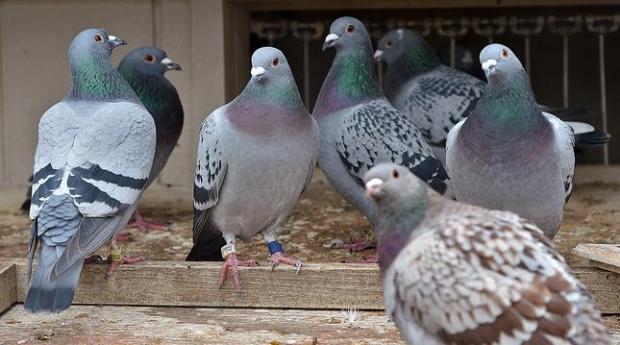
by Pigeon Patrol | Oct 17, 2023 | 4-S Gel Bird repellent, Animal Deterrent Products, Bird Deterrent Products, Bird Law, Bird Netting, Bird Spikes
BEIJING (Reuters) – Yu Yuguang’s heart beats faster every time he stands on his roof, eyes trained to the sky waiting for one of his pigeons to pass through the trap door of its home loft.
“Those are the most intense and enjoyable moments of a pigeon race,” says Yu, 57, adding that the sport is like playing the lottery.
He has been lucky. “Little Ancestor”, his 7-month-old pigeon, came first in a recent Chinese Racing Pigeon Association race, beating more than 4,800 competitors and completing a journey of just over 1,000 km from Langfang, near the Chinese capital Beijing, to Shanghai in a record time of 16 hours, 24 minutes and 54 seconds.
The 5,000 yuan ($760) prize money, however, pales in comparison to the 200,000 yuan ($30,600) Yu spends on his 500 pigeons each year.
In China, where pigeon racing has a long history, economic development has allowed the sport to spread beyond the ultra-wealthy. Membership in the Chinese Pigeon Association has jumped from tens of thousands in the 1980s to about 400,000, according to its vice president, Huang Jian.
By comparison Belgium, the traditional heartland of the sport, has about 20,000 pigeon fanciers.
That said, most of the huge sums that go into the sport are from deep-pocketed top-tier enthusiasts, eager to get their hands on coveted blood lines.
In November this year, a Chinese collector made headlines when he paid 1.6 million euros ($1.9 million) for a racing pigeon at an auction in Belgium – the latest in a string of eye-catching bids by Chinese fanciers that have driven up prices.
Some Chinese breeders are also willing to bid heavily on their own birds at auctions to increase their market value.
A Hangzhou-based breeder, who gave his name as Ying, travelled to Beijing last month for an auction, buying back six of his own pigeons which had placed well in races.
Ying, who bought them at prices ranging from 15,000 to 50,000 yuan, didn’t think twice about the cash he spent.
“I’m so in love with pigeons. I love them so much. In my heart, pigeons come first and my wife and children second,” he said.
Source
Pigeon Patrol
Pigeon Patrol Products & Services is the leading manufacturer and distributor of bird deterrent (control) products in Canada. Pigeon Patrol products have solved pest bird problems in industrial, commercial, and residential settings since 2000, by using safe and humane bird deterrents with only bird and animal -friendly solutions. At Pigeon Patrol, we manufacture and offer a variety of bird deterrents, ranging from Ultra-flex Bird Spikes with UV protection, Bird Netting, 4-S Bird Gel and the best Ultrasonic and audible sound devices on the market today.
Canada’s top wholesaler for bird deterrent products for twelve consecutive years.
Contact us at 1- 877– 4– NO-BIRD, (604) 585-9279 or visit our website at https://www.pigeonpatrol.ca/
Bird Gone, Pigeon Gone, Pigeon problems, pigeon spikes, 1-877-4NO-BIRD, 4-S Gel, Bird Control, Pigeon Control, bird repellent, Bird Spikes, sonic bird repellent, stainless steel bird spikes, bird spikes Vancouver, Ultra Sonic Bird Control, Bird Netting, Plastic Bird Spikes, Canada bird spike deterrents, Pigeon Pests, B Gone Pigeon, Pigeon Patrol, pest controller, pest control operator, pest control technician, Pigeon Control Products, humane pigeon spikes, pigeon deterrents, pigeon traps, Pigeon repellents, Sound & Laser Deterrents, wildlife control, raccoon, skunk, squirrel deterrent, De-Fence Spikes, Dragons Den, Pigeon, Pigeon Patrol, Pigeons Roosting, Vancouver Pigeon Control, Bird Spikes, Bird Control, Bird Deterrent, Pigeon Deterrent, Surrey Pigeon Control, Pest, Seagull deterrent Vancouver Pigeon Blog, Birds Inside Home De-fence, Pigeon Nesting, Bird Droppings, Pigeon Dropping, woodpecker control, Keep The Birds Away, Birds/rats, seagull, pigeon, woodpecker, dove, sparrow, pidgeon control, pidgeon problem, pidgeon control, flying rats, pigeon Problems, bird netting, bird gel, bird spray, bird nails, bird guard, Pigeon control, Bird deterrents, Pigeon deterrents, Bird control, solutions, Pigeon prevention, Pigeon repellent, Bird proofing, Pest bird management, Pigeon spikes, Bird netting, Humane bird control, Bird exclusion, Urban bird control, Anti-roosting devices, Pigeon removal, Bird barriers
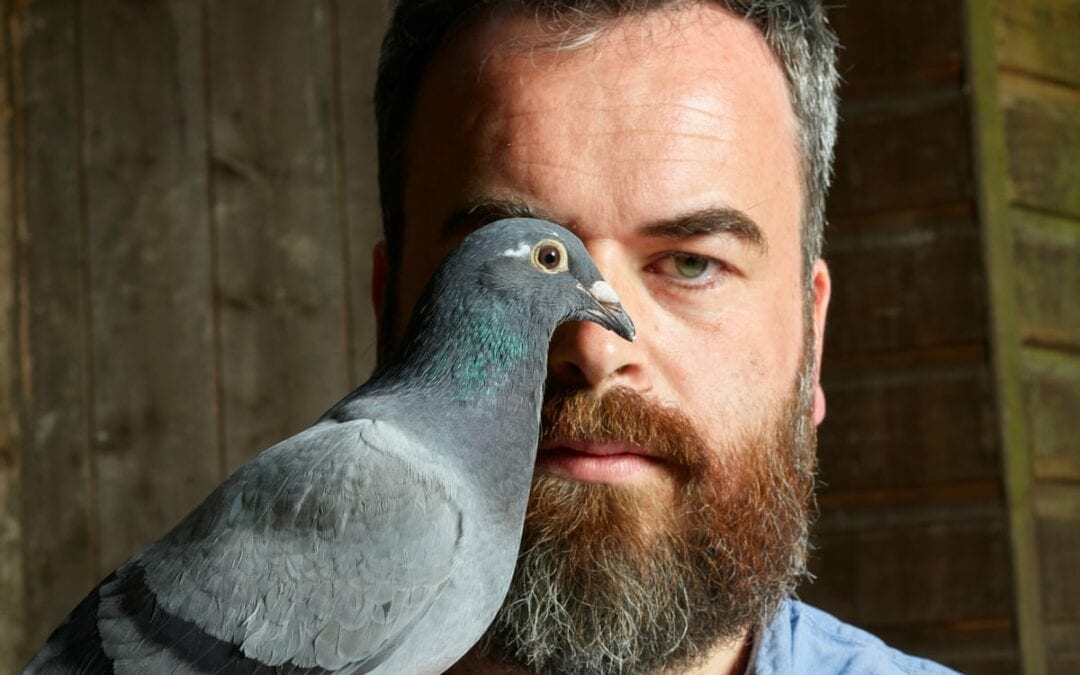
by Pigeon Patrol | Oct 17, 2023 | history of pigeons, MBCA, pet bird, Pigeon Control, Pigeon Droppings, Pigeon Patrol's Services, Pigeon Predators
Look! Up in the sky! It’s … not as much as there used to be. Three billion wild birds have vanished from North America’s air in 50 years; a new study calls that loss “staggering.” Three billion is as many as 1 bird in 4 — birds of the forests, birds of the grasslands, gone. And 50 years is about the same time that it took North America to send the passenger pigeon — once the most abundant bird on the continent, flying by the billions in flocks that blocked the sun for hours at a time — to send it into extinction. These creatures who evolved from the dinosaurs, who delight us with color and song — humans are crowding them out, plowing up and chopping down their habitat, poisoning them with pesticides, installing windows that they smash into, allowing domestic cats to kill them. And just over a century after the nation began protecting its native birds with the landmark Migratory Bird Treaty Act, the Trump administration is ready to weaken its enforcement. Steve Holmer heads the American Bird Conservancy, whose motto is “Bringing back the birds.” Can it be done, and how?
*****
Three billion birds in 50 years in this country. Why are they disappearing?
We believe it’s a combination of things. Migratory birds spend the majority of their year in the south, either the southern U.S. or in Central or South America. And so there’s all kinds of habitat issues there. And then when they actually migrate, they have what’s called stopover places, where they basically need to stop and fuel up again. If that habitat isn’t in good condition, or if they face threats there, then that could affect their migration.
Some new studies indicate that pesticides might prevent migrating birds from gaining sufficient weight. On these stopover points, they typically will gorge themselves and gain a bunch of weight so that they can fly — in some cases all the way up to the Arctic where they have their chicks. And then they come all the way back. It’s quite a gantlet that they go through. We think all of this is adding up into these declines.
Make the case for why bird life matters. People think aah, it’s just sparrows, aah, it’s just pigeons.
They’re actually a very good indicator of the overall health of the environment. When we see these bird declines, it’s an indication that in a sense there’s something out of balance. And we’ve seen certain habitats removed to a degree that the birds would become endangered. At the same time, we’ve had some very successful conservation efforts. We’ve brought the bald eagle back, for example. Its population is now increasing 10% a year, the result of banning DDT and other efforts to protect it.
Seventy years ago, Communist China crusaded against sparrows as “public animals of capitalism,” and killed billions. Without the sparrows to eat them, insects flourished, crops were destroyed and millions of Chinese starved. The earth needs birds. People need birds.
Birds play a crucial role within the ecosystem in terms of eating insects and other things and then also being eaten by other things. Part of the reason why the loss of the 3 billion birds is so significant is, that’s a huge loss of biomass that used to be in the system. We need to think about doing some things to try to restore balance.
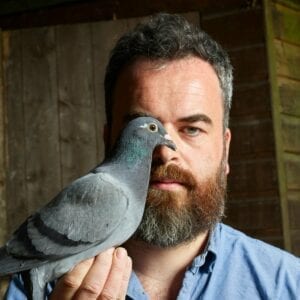
What kinds of birds were foremost among those 3 billion that aren’t around anymore?
Really common birds, meadowlarks; grassland birds in particular seem to have taken a really huge dip. There have been some new studies showing significant impacts from pesticides. And an ongoing process called intensification with agriculture, where they’re using more and more of the land in a much more intensive fashion. And the result is there’s just less available for wildlife.
It really gets down to the price of corn in some ways. And then the subsidies for corn ethanol have actually been pretty bad for birds because they’re leading to the sod-busting and we don’t have a whole lot of original prairie left.
About a year ago the Natural Resources Management Act was signed into law by the Trump administration — a bundle of bills, and a lot of conservation groups had campaigned for them. Isn’t that something of a step forward?
It wasn’t a perfect deal, though. There was still a rider in there that prevents protection for the greater sage grouse, which right now is in severe decline. The sage grouse is a bird that lives all across the Great Basin, a little bit in northern California. That kind of desert country is where you’ll find sage grouse. They actually will eat the sagebrush and hide in it. They’re an excellent indicator for basically pristine, wide open spaces. They like big areas. They like it quiet.
As energy development and other things have descended upon that region, we’ve actually seen the grouse population decline by as much as 90%.
When we see species like the meadowlark start to disappear, species that were so common, that’s not a good harbinger for rarer species in more endangered habitats, is it?
No, that’s exactly the issue. We do carefully look at all the bird populations. There is a lot of focus on the birds that might become endangered; there’s a big effort to head that off.
But we’ve also found that once the bird is listed [as endangered], recovery efforts tend to be successful. We did an analysis a couple of years ago and found out that the biggest need for the Endangered Species Act was to increase this funding for recovery.
A number of birds have just been delisted. One of them was the Kirtland’s warbler up in Michigan, and that’s just a result of successful conservation efforts. There are some good success stories — the interior least tern and the Kirtland’s warbler and a few others are definitely at a point where they seem to be safe and stable in terms of avoiding extinction and on their way to recovery.
But others worry you.
Well, changes to the law itself are worrying me. There’s been some rule-making that can make it very difficult to get protection for new species or provide for adequate habitat protection.
I do think that the process has become politicized and we’re feeling it’s a real challenge to get a level of protection that the birds really need.
People know the phrase “canary in the mine shaft,” meaning an early harbinger of something bad about to happen. Now it seems like our whole wild bird population is the canary in the mine shaft.
That’s right, and they also are showing that they are a big indicator for global warming and climate change. You’re seeing range shifts; because it’s a little warmer, the birds are actually much further north and they’re literally following the climate band as it as it changes.
They’re fortunate in the sense that they can fly to the to a new ideal environment for themselves. Not every critter has that luxury.
As we expand, as our population gets bigger, our agricultural needs are bigger, people cut down forests for wood for myriad purposes, the birds— they gotta give.
We really do need to provide incentives to landowners to grow trees and to maintain their forests. If property values shift too far, they might go into real estate and all that land gets developed.
If we need to grow trees for climate [change purposes], we should make it a real lucrative thing for the landowner to do.
How successful is that?
We’re seeing some success. The California carbon market is really probably the greatest example where it allows for forest conservation projects. Most of them have either longer rotation, forestry or reforestation. And so either way, the environment is winning, because we’re growing trees and absorbing that carbon and providing for that habitat. The California market is something that we probably need to make national.
There was a conflict in the Pacific Northwest in the 1990s over loggers versus habitat and the endangered northern spotted owl; I think one bumper stickers said something like, “Save a logger, eat a spotted owl.” Is that the way our relationship with the natural world in general and birds and in particular is going?
It is kind of ironic because birds in general are very popular, but a couple of birds like the greater sage grouse and the spotted owl have been the flashpoint for these huge land use issues, whether it’s conservation of the many millions of acres of public lands in the sagebrush country or the old-growth forest in the Pacific Northwest.
The fact that these birds declined so far is really kind of an indication that the habitat was not being used and not being properly conserved.
There’s been, I think, a very successful effort to protect the old-growth forest under the Northwest Forest Plan, but it’s by no means a perfect plan. But it has brought an end to the worst type of old-growth logging that used to happen.
And we are actually seeing some real benefits in terms of improved water quality. The forests in the region are now a big carbon sink where they absorb carbon instead of being a source of emissions every year or so.
So the public has seen some real side benefit in addition to the conservation of the forests.
Unfortunately, we have some policymakers who are trying to open up the old-growth forest again to logging, whether it be in Alaska or in the Pacific Northwest or Northern California. And we’re trying to counter that.
A lot of the work that we do is in partnership with other conservation groups. We manage a coalition called the Bird Conservation Alliance, which has over 200 groups doing public outreach and events to raise awareness about our program.
People like the idea of birds — they just don’t perhaps make the connection between, Oh, that’s a bird, and I like to hear it, I like to see it … and what it takes to keep that bird alive.
And sometimes people don’t see how their actions might affect things. A couple of the biggest sources of mortality for birds are window collisions and cats.
With windows, it’s estimated about a billion [birds are killed] a year, and it tends to be on the glass facades and ground-level windows that reflect foliage. There are ways, despite how the landscape is designed or where the windows are themselves; there’ve been windows tested that reduce the number of collisions. We’re working on various pieces of legislation that encourage the use of bird-safe building designs and materials.
There’s actually solutions for homeowners. There’s glass products and films that they can put on the windows to treat them so that the collisions can be greatly reduced.
The same with cats. Keeping cats indoors is safer for the cat. And it greatly reduces the predation that would happen if they were outdoors.
Many people let their cats outside to roam around, not thinking about the devastation that cats can wreak by killing birds — not a pleasant thing for bird lovers or for cat lovers.
In the West, there’s there is a big problem for cat owners seeing their cats outdoors having all kinds of issues, whether it’s fights with other cats, getting hit by cars and that kind of thing.
But the big issue lately is coyotes. If you’re leaving your cat outside, particularly at night, it’s a huge risk to them.
How many birds are cats killing?
Well, it is estimated it’s in the billions. Particularly when you think about the fledgling birds, they tend to be very vulnerable for their first couple of months, before they’ve really gotten to be full size and full strength. There’s just a tremendous toll every year.
What about windmills? President Trump says windmills kill a lot of birds.
Windmills do kill birds. We estimate as many as a million birds a year are killed by wind turbines and associated infrastructure. There are guidelines in place right now that can reduce this mortality. Unfortunately, they’re not being used that consistently. We’re working on a [proposed] piece of legislation called the Migratory Bird Protection Act that we think eventually could lead to these guidelines getting into use more often.
The changes that are happening to the [landmark 1918] Migratory Bird Treaty Act by the administration right now — one of the biggest problems is the fact that it won’t encourage us to solve these problems any longer. The law was intended to encourage industry to find ways to stop killing birds accidentally. So whether it be [birds] falling into oil pits or running into communications towers, there has been a lot of effort over time to reduce that mortality.
As a result of this change that’s been proposed by the administration and already put in effect through a legal opinion a couple of years ago, we’re actually no longer seeing enforcement that we used to have.
So at the same time bird populations are declining, we’re actually seeing weaker enforcement and weaker protection.
With wind and also with oil and gas and pretty much on any aspect, they’ve basically said that they’re no longer going to enforce the law.
And this could even be in extreme worst cases of oil spills where, in the past, there would have been big fines applied. Now they’re basically saying there’s no law any longer.
We’re already fighting, as is the state of California. We’re hopeful to overturn their efforts to weaken the law.
The Migratory Bird Protection Act, sponsored by Rep. Alan Lowenthal from California, would actually kind of bring about these best management practices that I was just talking about. The bill has gone through a House committee and is awaiting a vote on the House floor. And people can express their support to their lawmakers to pass the Migratory Bird Protection Act.
It sounds like California’s doing a pretty good job of getting on top of this.
California has an outstanding legislature in terms of passing bills to protect the environment and fill in the gap while the federal government is kind of dithering about right now.
One area where California took the lead was in the phase-out of toxic lead ammunition. There’s now nontoxic alternatives available.
Most Americans live in suburban or urban areas now. I’m wondering about the urban bird population.
There’s actually a lot that we can do in our urban areas. Urban forests are very important. And each homeowner can do things with their own landscaping, things that that could actually really benefit wildlife, just in our own back yard.
Are you a birdwatcher? Is there a species that speaks to you?
Right now, I’d have to say the marbled murrelet is the species that really speaks to me. It’s right on the coast of northern California and Oregon and Washington state. And it’s a neat little seabird that goes out and forges on little fish and then it nest in the tops of old-growth trees. Those tend to be the very biggest trees that are like 200 years old or older. So there’s a huge overlap between the marbled murrelet and these really high-carbon forests that are valuable in terms of the fight on climate change. There’s all kinds of habitat protection and recreation.
Source
Pigeon Patrol
Pigeon Patrol Products & Services is the leading manufacturer and distributor of bird deterrent (control) products in Canada. Pigeon Patrol products have solved pest bird problems in industrial, commercial, and residential settings since 2000, by using safe and humane bird deterrents with only bird and animal -friendly solutions. At Pigeon Patrol, we manufacture and offer a variety of bird deterrents, ranging from Ultra-flex Bird Spikes with UV protection, Bird Netting, 4-S Bird Gel and the best Ultrasonic and audible sound devices on the market today.
Canada’s top wholesaler for bird deterrent products for twelve consecutive years.
Contact us at 1- 877– 4– NO-BIRD, (604) 585-9279 or visit our website at https://www.pigeonpatrol.ca/
Bird Gone, Pigeon Gone, Pigeon problems, pigeon spikes, 1-877-4NO-BIRD, 4-S Gel, Bird Control, Pigeon Control, bird repellent, Bird Spikes, sonic bird repellent, stainless steel bird spikes, bird spikes Vancouver, Ultra Sonic Bird Control, Bird Netting, Plastic Bird Spikes, Canada bird spike deterrents, Pigeon Pests, B Gone Pigeon, Pigeon Patrol, pest controller, pest control operator, pest control technician, Pigeon Control Products, humane pigeon spikes, pigeon deterrents, pigeon traps, Pigeon repellents, Sound & Laser Deterrents, wildlife control, raccoon, skunk, squirrel deterrent, De-Fence Spikes, Dragons Den, Pigeon, Pigeon Patrol, Pigeons Roosting, Vancouver Pigeon Control, Bird Spikes, Bird Control, Bird Deterrent, Pigeon Deterrent, Surrey Pigeon Control, Pest, Seagull deterrent Vancouver Pigeon Blog, Birds Inside Home De-fence, Pigeon Nesting, Bird Droppings, Pigeon Dropping, woodpecker control, Keep The Birds Away, Birds/rats, seagull, pigeon, woodpecker, dove, sparrow, pidgeon control, pidgeon problem, pidgeon control, flying rats, pigeon Problems, bird netting, bird gel, bird spray, bird nails, bird guard, Pigeon control, Bird deterrents, Pigeon deterrents, Bird control, solutions, Pigeon prevention, Pigeon repellent, Bird proofing, Pest bird management, Pigeon spikes, Bird netting, Humane bird control, Bird exclusion, Urban bird control, Anti-roosting devices, Pigeon removal, Bird barriers
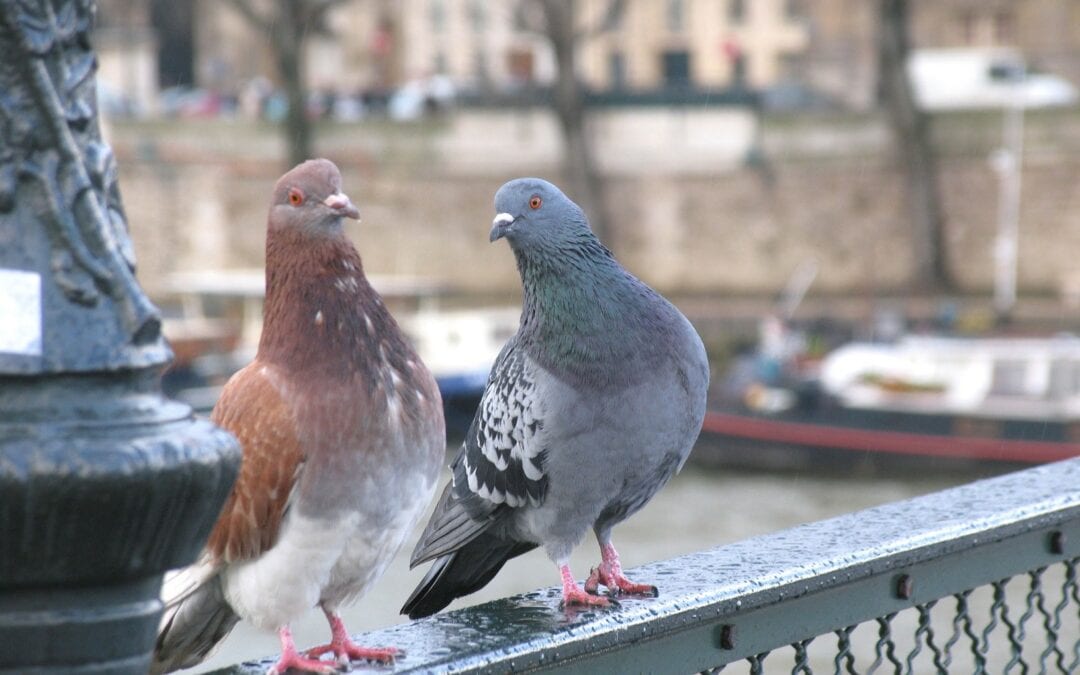
by Pigeon Patrol | Oct 17, 2023 | Bird Spike, Pigeon Spikes, Pigeons, Pigeons in the News, Raccoons, Sparrows, UltraSonic Bird Control
Scientists found that attaching small weights to pigeons causes them to shoot up in the social hierarchy. The finding is important because scientists often attach trackers to pigeons.
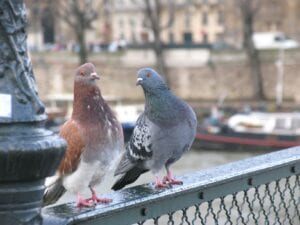
Now a story about what happens when you turn society upside down – specifically, pigeon society.
It turns out there is a social hierarchy among pigeons, and it definitely pays to be the big bird on campus.
Being top of the dominance hierarchy basically gives you preferential access to everything. It means you get priority access to food, priority access to mates.
That’s Steve Portugal, a zoologist and biologist at Royal Holloway, University of London. And contrary to what you may have heard about the early bird getting the worm, in the case of pigeons, it is heavier birds that get all the perks.
So Portugal and his colleagues wondered what would happen if you made lighter pigeons feel heavier. If you beefed them up, would they punch above their weight?
They tested their theory in a captive flock of homing pigeons. They identified the birds in the bottom half of the hierarchy and loaded them up with tiny weights – little bird backpacks, actually.
And sure enough, when I did that, they became much more aggressive, started much more fights and won many more fights as well.
The former head honcho pigeons took notice.
What was fascinating just to sort of watch anecdotally was, you know, they could see that they were a bit like, what’s going on? You know, what’s happening? We’re being sort of – there’s a military coup, almost, against us.
Apparently, they fought back at first. But eventually, among the males, the birds with the little backpacks prevailed.
The researchers say the extra weight might have made the lighter pigeons feel like they were in better shape, like they had more energy to burn picking fights.
Or perhaps they just hunted for food more aggressively than usual because, you know, strutting around with weights meant burning more calories and needing more food. The findings appear in the journal Biology Letters.
Portugal says this research is important because scientists often attach tiny trackers to pigeons and other animals, and that adds extra weight.
They might not be physiologically impeded by them, but they – it might be having an impact on their social structure, their social networks, their group dynamics.
As for the pigeons in this study, once the backpacks came off, the old pecking order snapped right back into place. The lightweights were back to scratching out a living at the bottom of the heap.
Source
Pigeon Patrol
Pigeon Patrol Products & Services is the leading manufacturer and distributor of bird deterrent (control) products in Canada. Pigeon Patrol products have solved pest bird problems in industrial, commercial, and residential settings since 2000, by using safe and humane bird deterrents with only bird and animal -friendly solutions. At Pigeon Patrol, we manufacture and offer a variety of bird deterrents, ranging from Ultra-flex Bird Spikes with UV protection, Bird Netting, 4-S Bird Gel and the best Ultrasonic and audible sound devices on the market today.
Canada’s top wholesaler for bird deterrent products for twelve consecutive years.
Contact us at 1- 877– 4– NO-BIRD, (604) 585-9279 or visit our website at https://www.pigeonpatrol.ca/
Bird Gone, Pigeon Gone, Pigeon problems, pigeon spikes, 1-877-4NO-BIRD, 4-S Gel, Bird Control, Pigeon Control, bird repellent, Bird Spikes, sonic bird repellent, stainless steel bird spikes, bird spikes Vancouver, Ultra Sonic Bird Control, Bird Netting, Plastic Bird Spikes, Canada bird spike deterrents, Pigeon Pests, B Gone Pigeon, Pigeon Patrol, pest controller, pest control operator, pest control technician, Pigeon Control Products, humane pigeon spikes, pigeon deterrents, pigeon traps, Pigeon repellents, Sound & Laser Deterrents, wildlife control, raccoon, skunk, squirrel deterrent, De-Fence Spikes, Dragons Den, Pigeon, Pigeon Patrol, Pigeons Roosting, Vancouver Pigeon Control, Bird Spikes, Bird Control, Bird Deterrent, Pigeon Deterrent, Surrey Pigeon Control, Pest, Seagull deterrent Vancouver Pigeon Blog, Birds Inside Home De-fence, Pigeon Nesting, Bird Droppings, Pigeon Dropping, woodpecker control, Keep The Birds Away, Birds/rats, seagull, pigeon, woodpecker, dove, sparrow, pidgeon control, pidgeon problem, pidgeon control, flying rats, pigeon Problems, bird netting, bird gel, bird spray, bird nails, bird guard, Pigeon control, Bird deterrents, Pigeon deterrents, Bird control, solutions, Pigeon prevention, Pigeon repellent, Bird proofing, Pest bird management, Pigeon spikes, Bird netting, Humane bird control, Bird exclusion, Urban bird control, Anti-roosting devices, Pigeon removal, Bird barriers

